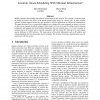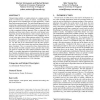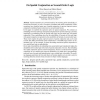683 search results - page 98 / 137 » Exploiting Logical Mobility in Mobile Computing Middleware |
USENIX
2000
14 years 11 months ago
2000
Mobile computers often benefit from software which adapts to their location. For example, a computer might be backed up when at the office, or the default printer might always be ...
MOBICOM
2006
ACM
15 years 3 months ago
2006
ACM
Characterizing mobility or contact patterns in a campus environment is of interest for a variety of reasons. Existing studies of these patterns can be classified into two basic a...
FEDCSIS
2011
13 years 9 months ago
2011
—Collaborative mechanisms between services are a crucial aspect in the recent development of pervasive computing systems based on the paradigm of service-oriented architecture. C...
CORR
2004
Springer
14 years 9 months ago
2004
Springer
Abstract. Spatial conjunction is a powerful construct for reasoning about dynamically allocated data structures, as well as concurrent, distributed and mobile computation. While re...
WCNC
2008
IEEE
15 years 4 months ago
2008
IEEE
—Popularity of group-oriented applications motivates research on security and privacy protection for group communications. A number of group key agreement protocols exploiting ID...



